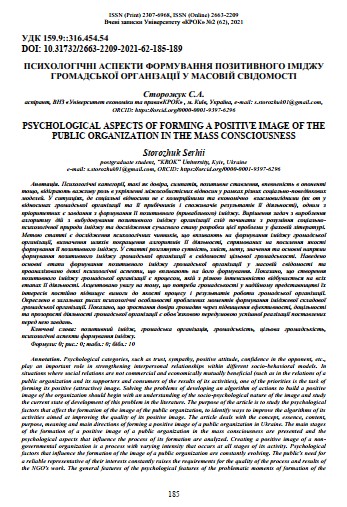PSYCHOLOGICAL ASPECTS OF FORMING A POSITIVE IMAGE OF THE PUBLIC ORGANIZATION IN THE MASS CONSCIOUSNESS
DOI:
https://doi.org/10.31732/2663-2209-2021-62-185-189Keywords:
positive image, public organization, public community, target public, psychological aspects of image formation, state regulatory bodiesAbstract
Psychological categories, such as trust, sympathy, positive attitude, confidence in the opponent, etc., play an important role in strengthening interpersonal relationships within different socio-behavioral models. In situations where social relations are not commercial and economically mutually beneficial (such as in the relations of a public organization and its supporters and consumers of the results of its activities), one of the priorities is the task of forming its positive (attractive) image. Solving the problems of developing an algorithm of actions to build a positive image of the organization should begin with an understanding of the socio-psychological nature of the image and study the current state of development of this problem in the literature. The purpose of the article is to study the psychological factors that affect the formation of the image of the public organization, to identify ways to improve the algorithms of its activities aimed at improving the quality of its positive image. The article deals with the concept, essence, content, purpose, meaning and main directions of forming a positive image of a public organization in Ukraine. The main stages of the formation of a positive image of a public organization in the mass consciousness are presented and the psychological aspects that influence the process of its formation are analyzed. Creating a positive image of a non-governmental organization is a process with varying intensity that occurs at all stages of its activity. Psychological factors that influence the formation of the image of a public organization are constantly evolving. The public's need for a reliable representative of their interests constantly raises the requirements for the quality of the process and results of the NGO's work. The general features of the psychological features of the problematic moments of formation of the image component of the public organization are outlined. Increasing public confidence through increasing the efficiency, expediency and transparency of NGO activity is a prerequisite for successful implementation of its goals.
Downloads
References
Почепцов Г. Г. Паблик Рилейшнз для профессионалов. Москва : «Рефл-бук», Київ : «Ваклер», 2002. 624 с.
Мясищев В. Н. Психология отношений. Избранные психологические труды. 1995. 356 с.
Гурій Б. Б., Горбач І. І. Контент-аналіз висвітлення державної молодіжної політики в періодичних виданнях Львівської області. Молодь в умовах нової соціальної перспективи: матеріали Міжнародної науково-практичної конференції (24 травня 2007 р.). Житомир, 2007. С. 140-142.
Карамушка Л. М. Психологія управління. Київ : Міленіум, 2003. 421 с.
Панасюк А. Ю. Формирование имиджа. Стратегии, технологии, психотехніки. Москва : Омега-Л, 2009. 266 с.
Перелигіна Е. Б. Психологія іміджу. Харків : Аспект-пресс, 2012. 223 с.
Obodkova Е. А. “Socio-psychological structure and content of the organization's image”, Ph.D. Thesis, Social Psychology, Moscow State University, 2007. Moscow, Russia.
Петрунько О. В. Образи провідних українських політиків у приватних розмовах громадян. Наукові студії із соціальної та політичної психології. 2005. Випуск 10 (13). С. 238-250.
Петрунько О. В., Фролов П. Д. Можливості сукупного тексту з точки зору прогнозування результатів голосування. Інформаційний вплив: теорія і практика прогнозування. 2011. С. 168-201.
Ромат Є. В. Реклама. Харків: Студцентр, 2000. 480 с.



